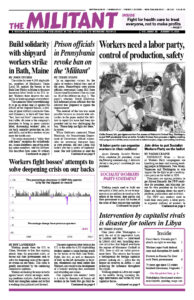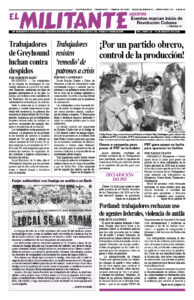Nine years after Washington — with the aid of its imperialist rivals in London and Paris — intervened in Libya’s civil war, launching massive airstrikes that helped overthrow the regime of Moammar Gadhafi in 2011, there is still no stable government there. The country has become a battleground for foreign capitalist powers seeking oil — Libya has the largest oil reserves in Africa — and jockeying for influence throughout the region.
Working people in Libya are caught in the middle, facing unending foreign intervention and battles by rival capitalist forces.
On one side is the Government of National Accord in Tripoli, headed by Prime Minister Fayez al-Sarraj, which was cobbled together in a U.N.-brokered deal in 2015. It remains in power in the capital with the backing of the Turkish, Qatari and Italian rulers.
Arrayed against them are the disparate forces of the Libyan National Army commanded by Gen. Khalifa Haftar, based in the eastern part of the country. Over the last year Haftar has seized control of most of Libya, with support and large-scale military aid from the governments of Russia, Egypt, the United Arab Emirates and France.
Last month the Wagner Group, mercenary forces organized by Moscow, seized the country’s biggest oilfield, which is partly owned by Repsol, a Spanish company. They also took over Es Sider, Libya’s main oil-exporting port.
For the most part Washington hasn’t thrown its weight decisively behind either faction.
When Haftar, backed by Russian mercenaries and Moscow’s air power, was on the brink of taking Tripoli, the Turkish government stepped in with decisive military aid for Sarraj. Turkish President Recep Tayyip Erdogan sent military advisers, drones and air defense systems in January, along with 3,800 Turkish-backed Syrian militia fighters, which succeeded in pushing back Haftar’s forces.
Turkish capitalists have longstanding economic interests in Libya. The Turkish Contractors Association estimated that in 2011, when Gadhafi was killed, Turkish capitalists had more than $18 billion in contracts there. The Turkish government is asking Sarraj to pay for some $3.7 billion owed to Turkish firms.
At the same time that Erdogan agreed to send more military aid, Sarraj signed a memorandum redrawing Libya’s maritime borders, accepting Turkey’s claim to potential natural gas deposits in large areas of the Mediterranean Sea, also long coveted by the rulers in France and Greece.
When the Turkish forces stepped in and pushed back Haftar, including in an air and ground attack on Sirte, the neighboring Egyptian regime got nervous. Both Erdogan and Sarraj have close ties to the Egyptian government’s main bourgeois rival, the Muslim Brotherhood. Egyptian President Abdel Fattah al-Sisi came to power by defeating the Brotherhood, and then carrying out systematic repression, arrests and executions against the group’s leadership.
On July 20 the Egyptian parliament unanimously authorized the deployment of troops to Libya.
Impact of war on working people
Over 400,000 Libyans have been forced to flee from their homes, according to the U.N. Much-needed hospital facilities have been attacked during the conflict. Both sides have committed atrocities.
The fighting in Libya is a reflection of the failure of the “Arab Spring,” mass uprisings in 2010 and 2011 that shook, and in some cases toppled, dictatorial governments in Egypt, Morocco, Yemen, Tunisia and Libya. But in the absence of a revolutionary, working-class leadership, the main gain of the mass protests — political space — was pushed back.
When Gadhafi’s regime was overthrown and he was executed, President Barack Obama gloated that “one of the world’s longest-serving dictators is no more.”
His vice president, Joe Biden, who is now the front-runner for the White House, called the assault on Libya a “prescription for how to deal with the world.”
But what followed was a political vacuum, with no working-class leadership to chart a course forward for Libya’s workers and farmers, leading to a new round of imperialist interference, war and crisis for the toilers.
“Working people should condemn the intervention by Washington, Paris” and other imperialist powers “in Libya’s civil war,” and the gruesome execution of Gadhafi, the Militant editorialized in 2011. “Toilers and other oppressed layers will have an opportunity to fight for increased space to organize and advance their own interests. Imperialist powers, the enemies of working people the world over, always have been and always will be an obstacle to this struggle.”

